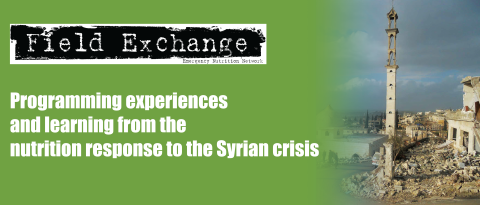Competing for scarce resources: the new concern for Syrian refugees and host communities in Lebanon
By Bassem Saadallaoui
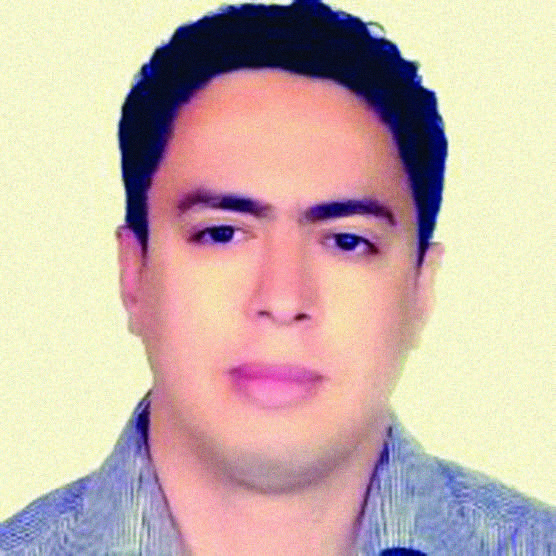 Bassem Saadallaoui was Country WaSH Coordinator for ACF Lebanon from May 2013 to July 2014. He is a post-graduate Water and Sanitation Engineer, specialised in Modelling in Hydraulics & Environment. He is a member of the Water Supply and Sanitation Collaborative Council (WSSCC), Special Adviser to the editor/Environment and Sustainable Development of the Digital Journal of Communication on Youth Initiatives in Francophone Africa (Africa'Action) and a member of the Arab Integrated Water Resources Management Network (AWARENET).
Bassem Saadallaoui was Country WaSH Coordinator for ACF Lebanon from May 2013 to July 2014. He is a post-graduate Water and Sanitation Engineer, specialised in Modelling in Hydraulics & Environment. He is a member of the Water Supply and Sanitation Collaborative Council (WSSCC), Special Adviser to the editor/Environment and Sustainable Development of the Digital Journal of Communication on Youth Initiatives in Francophone Africa (Africa'Action) and a member of the Arab Integrated Water Resources Management Network (AWARENET).
Thanks to Rui Alberto Oliverira, ACF Country Director for Lebanon, for his help in finalising this article.
WaSH context and ACF intervention: The state of play
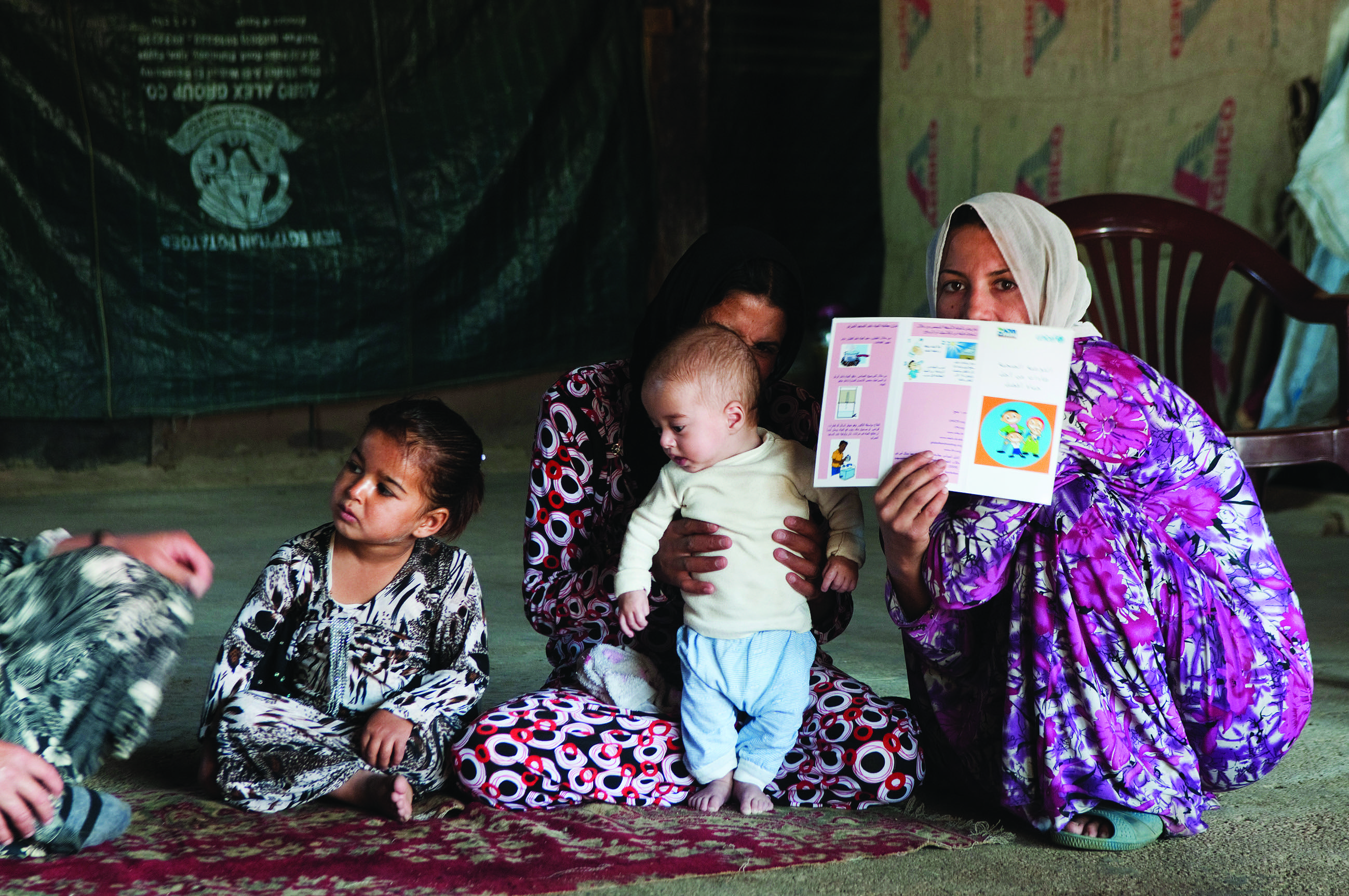 The Water and Sanitation sector in Lebanon has constantly faced several challenges in terms of resources, capacities and management. Indeed, water access remains always the main concern for service users living either in a refugee settlement or in one of the Lebanese towns. The Syrian conflict has resulted in a series of massive influxes of refugees in 1,500 different areas in Lebanon with a concentration of 62% in Bekaa and the North1. According to the United Nations High Commissioner for Refugees (UNHCR), there are 1,119,585 Syrian refugees in Lebanon (30th of June 2014), including 48,783 waiting for registration. This significant figure is added to the 4.5 million Lebanese2 already struggling to acquire water and sanitation services at the community level. According to the Lebanon Country Water Sector Assistance Strategy 2012-2016, the deficiency of water supply networks, the imbalance between seasons and the fast rising demand (communal and industrial) are leading to chronic water shortages3. Already, dry season shortages are emerging and water quality is deteriorating. For instance, tap water is intermittently available and the general public perception of water quality is not positive. A Knowledge, Attitude and Practices (KAP) survey conducted in some vulnerable refugee settlements in central and western Bekaa affected by the water scarcity, found that more than half (51%) of households considered available water as unsafe. Host community and Syrian refugees have already started to compete for rare resources, such as water, food and accommodation, as well as basic facilities, such as municipality solid waste disposal, and other services, e.g. water trucking and latrines (toilets) desludging.
The Water and Sanitation sector in Lebanon has constantly faced several challenges in terms of resources, capacities and management. Indeed, water access remains always the main concern for service users living either in a refugee settlement or in one of the Lebanese towns. The Syrian conflict has resulted in a series of massive influxes of refugees in 1,500 different areas in Lebanon with a concentration of 62% in Bekaa and the North1. According to the United Nations High Commissioner for Refugees (UNHCR), there are 1,119,585 Syrian refugees in Lebanon (30th of June 2014), including 48,783 waiting for registration. This significant figure is added to the 4.5 million Lebanese2 already struggling to acquire water and sanitation services at the community level. According to the Lebanon Country Water Sector Assistance Strategy 2012-2016, the deficiency of water supply networks, the imbalance between seasons and the fast rising demand (communal and industrial) are leading to chronic water shortages3. Already, dry season shortages are emerging and water quality is deteriorating. For instance, tap water is intermittently available and the general public perception of water quality is not positive. A Knowledge, Attitude and Practices (KAP) survey conducted in some vulnerable refugee settlements in central and western Bekaa affected by the water scarcity, found that more than half (51%) of households considered available water as unsafe. Host community and Syrian refugees have already started to compete for rare resources, such as water, food and accommodation, as well as basic facilities, such as municipality solid waste disposal, and other services, e.g. water trucking and latrines (toilets) desludging.
Map 1: Concentration of Syrian refugees in Lebanon (June, 2014)
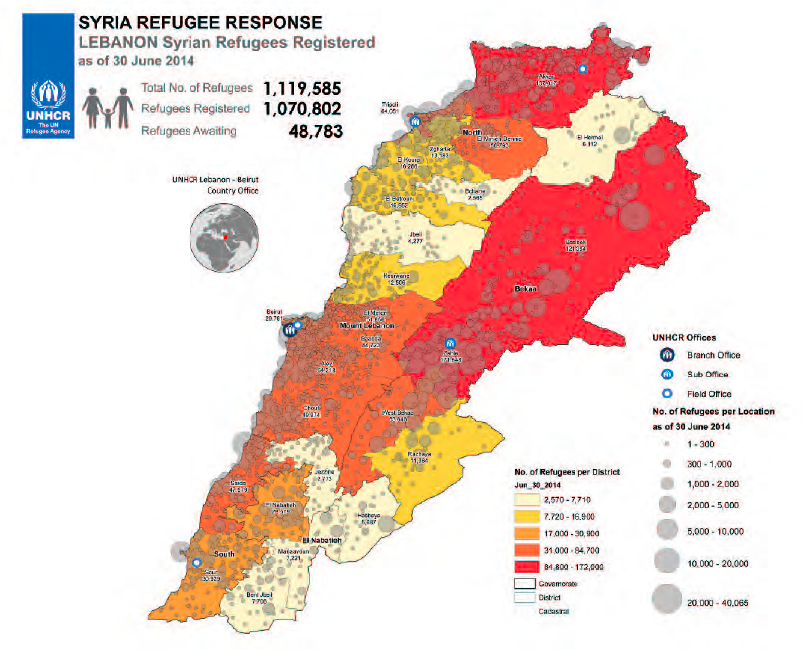
Source: UNHCR Lebanon
ACF WaSH programme
Action Against Hunger (ACF-Lebanon) started to support the affected population at the beginning of the Syrian conflict. The beneficiaries are not only the Syrian refugees fleeing the war in their country but also the Lebanese community and governmental institutions, such as Bekaa Water Establishment and several municipalities in Bekaa and South Lebanon. According to ACF WaSH assessments conducted inside informal tented settlements (ITS) and collective shelters, the main identified needs are associated with access to safe water and sanitation infrastructures.
In terms of water, ACF has followed a household approach. In practice, each tent may be occupied by more than one household. The average household size is roughly five members and may be up to 14 in some cases. Given the significant need, ACF established a priority list according to vulnerability criteria based on the level of access to basic services. Families with lowest access to water and sanitation facilities are prioritised with a short timeframe of intervention. The beneficiaries are provided with water tanks in order to increase the storage at household level; water tanks were distributed as a practical and successful solution during a snowy winter to help beneficiaries ensure a minimum quantity of water at household level. During this time, the water trucking services were reduced due to slippery roads and communal water tanks and tap stands were frozen. These water tanks have also proved a useful solution to ensure household storage during times of water shortage in the summer. Indeed, it was observed that beneficiaries’ water consumption is more rational when it comes to their own reserves.
A recent survey conducted in several ITS in central and western Bekaa showed that the average water consumption inside the settlements is 63 litres/per person/per day4 which is well above the standard of 35 litres/person/day suggested by the WaSH sector in Lebanon (see Figure 1). Moreover, the survey showed a large disparity in water consumption, from less than 35litres/p/day to more than 120litres/p/day depending on the family’s social level (according to vulnerability assessments) or habits (daily cleaning in front of the tents using water). However, 23% of ITS households are still below the standards of the WaSH sector due to limited access to water sources (scarcity or absence of resources, shared resources, and conflict with landlords).
ACF is working to improve the water access situation of these households by compensating with water trucking action as a short term action and by rehabilitating the existing water points and networks in coordination with Bekaa Water Establishment and the concerned municipalities. For instance, ACF identified some non-operational wells and boreholes in Taanayel, KamdEllouz and Arsaland and has plans to rehabilitate them (cleaning, chlorination and protection) in order to increase the water resources inside the settlements and local populations. Moreover, 27% of ITS households in Central and Western Bekaa are using the Bekaa Water Establishment network in one way or another5. These 27% represent a huge unexpected number that disrupts the normal functioning of the public network. As described previously, the public network is already facing challenges (quantity, quality, management) and it is unable to fulfil the entire host community needs. Likewise, the municipalities are taking care of more than 70% of the solid waste disposal resulting from the different ITS. The average disposal price is 15$ per ton. Given that a municipality disposes of a minimum of eight tons per day, we can imagine the extra funds and resources required to meet the new needs.
All this highlights how the Syrian crisis has amplified existing challenges. Besides, water quality remains the major concern for Syrian refugees in the tented settlements. Most of the households cannot afford bottled water, especially the large families. During the emergencies and the first days of establishing in Lebanon, households are obliged to use the existing water sources for drinking. To avoid diarrhoea and other water related diseases, ACF provided all the beneficiaries with ceramic water filters. The advantage of these filters is the ease of maintenance and the practical replacement of ceramic candles, which are available in the local market at affordable prices. The average life duration of the ceramic candles is one year if well maintained. Nevertheless, 28% of water filter users in Central and Western Bekaa confirmed they never maintained their filters due to lack of time and/or lack of knowledge; this is despite several awareness sessions conducted by ACF to familiarise the households with filter use and maintenance.
In addition to ceramic water filters distribution, ACF used to undertake bacteriological and chemical water analysis on different samples collected at household level, water point level and even from the public network. At the beginning of the intervention, it was easy to send all the water samples to be analysed in the few private laboratories in Bekaa but with the increasing number of ITS, the number of samples grew to the degree that the laboratories could no longer absorb them. Thus, ACF established its own in-house water analysis laboratory with a capacity of more than 80 water tests per day. ACF observations and field experience showed that most of the Syrian refugees have a minimum background level of hygiene practices. However, a survey found that 14% of households did not know the risks or diseases related to the consumption of unsafe water.
The ‘software’ side of WaSH programming
The software component of ACF intervention represents an important part of the response to raise awareness concerning the rational use of water and the establishment of best hygiene practices. In each tented settlement, ACF established a WaSH committee composed of five members, including at least two women. The role of the WaSH committee is to ensure good communication between the ACF field team and the beneficiaries inside the tented settlements, to inform ACF about newcomers and urgent needs in the settlement and to reiterate the hygiene practices and other messages among beneficiaries.
Furthermore, the entire WaSH component came to support the nutritional intervention by maintaining continuous access to safe water and hygienic sanitation at the nutrition child-friendly tents established by ACF in different tented settlements in Arsaal (see field article in this issue regarding the programme). Additionally, an ACF/UNICEF WaSH intervention is currently ongoing, to deliver access to WaSH facilities in NFE Schools (Non Formal Education Schools) located inside or nearby settlements for children between 5 and 12 years old. ACF provided the informal schools with necessary water storage, water filters, hand-washing points, hygiene kits, latrines and desludging services, in order to keep a hygienic environment and avoid water related diseases among more than 5,000 children in Bekaa.
Linking relief, rehabilitation and development
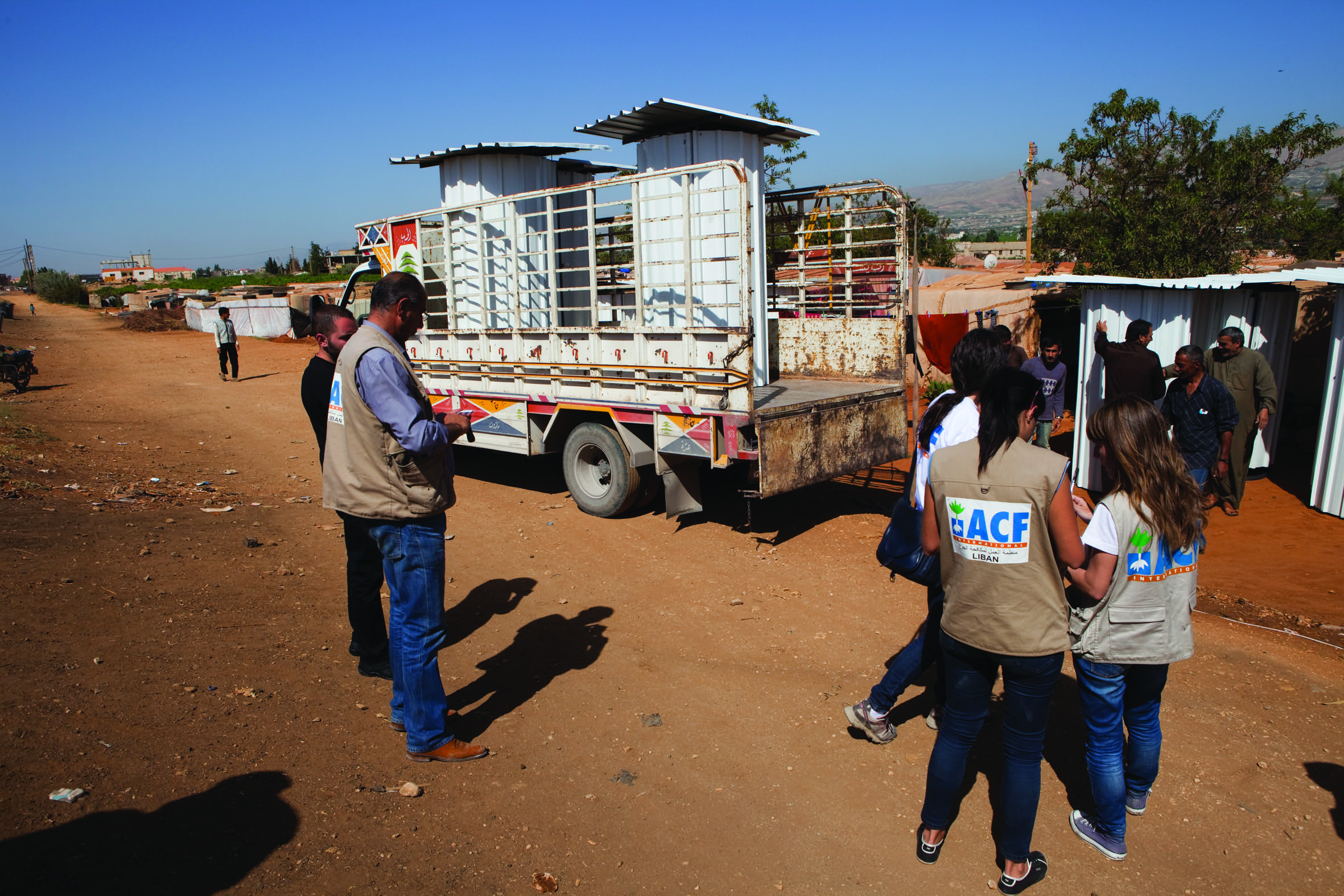 ACF is convinced that supporting the host community in Lebanon is a part of the mid-term and long-term solution to the crisis. With the financial support of the European Commission (ECHO) and in collaboration with Bekaa Eater Establishment and the municipalities of Sarayin, Tamnin El Tahata and Torbol, ACF managed to identify four structural projects consisting of the construction and the equipping of two new deep boreholes, the rehabilitation of a 100m3 water reservoir and the rehabilitation of an existing pumping station. These identified actions will increase the public network capacity and therefore, improve the water access to both Syrian refugees and the host community. Moreover, ACF executed a sewage network rehabilitation project that allowed the municipality of Ghazze to reduce the risk related to the non-functional sanitation network and allowed host community and three existing schools to connect to the new sewage line with a total number of 8,000 beneficiaries. While desludging services were the fastest and easiest solution to keep a hygienic environment inside the tented settlements, the high cost of this solution made it non-sustainable. Furthermore, the huge number of latrines and the limited capacity of the sewage network made the sludge disposal more complicated. The minimum cost of one latrine desludging service is about 15$ and the total amount can amount to millions of dollars, knowing that for every 15 to 20 persons, there is at least one latrine that should be desludged every month. Latrine desludging is not an environmentally friendly solution. Indeed, a considerable amount of black water is thrown into the Litani River, which is Lebanon’s largest river feeding an important part of Lebanese agricultural lands. ACF added a contractual obligation to incite desludging service providers to discard the collected black water into the dedicated treatment plants.
ACF is convinced that supporting the host community in Lebanon is a part of the mid-term and long-term solution to the crisis. With the financial support of the European Commission (ECHO) and in collaboration with Bekaa Eater Establishment and the municipalities of Sarayin, Tamnin El Tahata and Torbol, ACF managed to identify four structural projects consisting of the construction and the equipping of two new deep boreholes, the rehabilitation of a 100m3 water reservoir and the rehabilitation of an existing pumping station. These identified actions will increase the public network capacity and therefore, improve the water access to both Syrian refugees and the host community. Moreover, ACF executed a sewage network rehabilitation project that allowed the municipality of Ghazze to reduce the risk related to the non-functional sanitation network and allowed host community and three existing schools to connect to the new sewage line with a total number of 8,000 beneficiaries. While desludging services were the fastest and easiest solution to keep a hygienic environment inside the tented settlements, the high cost of this solution made it non-sustainable. Furthermore, the huge number of latrines and the limited capacity of the sewage network made the sludge disposal more complicated. The minimum cost of one latrine desludging service is about 15$ and the total amount can amount to millions of dollars, knowing that for every 15 to 20 persons, there is at least one latrine that should be desludged every month. Latrine desludging is not an environmentally friendly solution. Indeed, a considerable amount of black water is thrown into the Litani River, which is Lebanon’s largest river feeding an important part of Lebanese agricultural lands. ACF added a contractual obligation to incite desludging service providers to discard the collected black water into the dedicated treatment plants.
Coordination saves lives
In the midst of all the WaSH responses provided by the different international and national non-governmental organisations (NGO’), the need for coordination seems to be vital. Indeed, a few days after the beginning of the Syrian conflict, hundreds of local and international organisations started emergency response by providing water, sanitation, hygiene promotion, shelter, education and health services. In terms of WaSH activities, it was difficult for the different organisations to understand who was doing what and where. For instance, some water tanks were distributed in the same locations by different NGOs. Water trucking services were provided by different suppliers funded by different NGOs in the same settlement, which made the quality control of water very difficult. In term of non-food items distribution, such as hygiene kits and winterisation kits (e.g. blankets and stoves), double distributions encouraged the beneficiaries to sell items on the local market.
The WaSH sector, led by UNHCR and co-led by UNICEF, has a coordination role helping the organisations understand who is doing what and where and also organising the geographical targeting according to the needs. ACF was one of the international organisations involved in the water scarcity task force led by UNHCR and UNICEF and has already started to rehabilitate existing water points, repair some broken pipes and create new boreholes to increase the existing capacity. The WaSH sector coordination played an important role in the harmonisation of awareness messages between all the NGOs, which are mainly related to water saving, the best hygiene practices and health messages among beneficiaries. Moreover, the WaSH sector was involved in the water scarcity crisis and mobilised all the NGOs to work together in coordination with governmental institutions to assess the needs in the most vulnerable locations and to find both short term solutions and some longer term ones for both Syrian refugees and host communities.
For more information, contact: ACF Lebanon, Choubassi Building, Saadnayel, Bekaa, email: roliveira@lb.acfspain.org
1 UNHCR. (2014). Lebanon. Récupéré sur Syria regional refugee response: http://data.unhcr.org/syrianrefugees/country.php?id=122
2 World Bank. (2012). Lebanon Country Water Sector Assistance Strategy. Middle East and North Africa Region: Sustainable Development Department.
3World Bank. (2012). Lebanon Data. Récupéré sur World Bank Data: http://data.worldbank.org/country/lebanon
4 ACF. (2014). Humanitarian WASH Response to the conflict affected population in Bekaa Valley. KAP Survey.ACF.
5 See footnote 4


